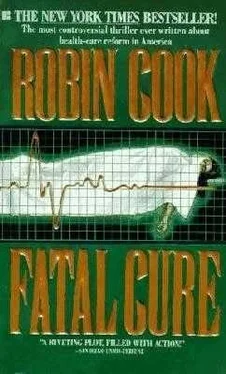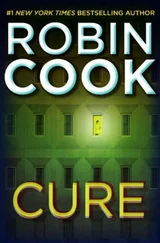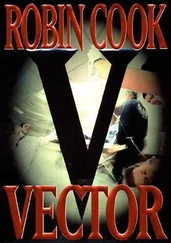"We had lunch, to be precise," Dr. Holster said.
"I know that Dr. Hodges wanted to see you concerning a patient by the name of Clark Davenport."
"That's correct," Dr. Holster said. "We had a long discussion about the case. Unfortunately, Mr. Davenport had just died. I'd treated him for prostate cancer with what we thought was great success only four or five months prior to his demise. Both Dr Hodges and myself were surprised and saddened by his passing."
"Did Dr. Hodges ever mention exactly what Mr. Davenport died of?" David asked.
"Not that I recall," Dr. Holster said. "I just assumed it was a recurrence of his prostate cancer. Why do you ask?"
"Mr. Davenport died in septic shock after a series of grand mal seizures," David said. "I don't think it was related to his cancer."
"I don't know if you can say that," Dr. Holster said. "It sounds like he developed brain metastases."
"His MRI was normal," David said. "Of course, there was no autopsy so we don't know for sure."
"There could have been multiple tumors too small for the MRI to pick up," Dr. Holster said.
"Did Dr. Hodges mention that there was anything about Mr. Davenport's hospital course that he thought was out of the ordinary or unexpected?" David asked.
"Only his death," Dr. Holster said.
"Did anything else come up during your lunch?"
"Not really. Not that I can recall," Dr. Holster said. "When we were done eating I asked Dennis if he'd like to come back to the radiotherapy center and see the new machine he'd been responsible for us having received."
"What machine is that?" David asked.
"Our linear accelerator," Dr. Holster said. He beamed like a proud parent. "We have one of the best machines made. Dennis had never seen it although he'd intended to come by on numerous occasions. So we stopped in and I showed it to him. He was truly impressed. Come on, I'll show you."
Dr. Holster was out the door before David could respond one way or the other. He caught up with Dr. Holster halfway down a windowless hallway. David wasn't much in the mood to see a radiotherapy machine, but to be polite he felt he had little choice. They reached the treatment room and approached a piece of high-tech equipment.
"Here she is," Dr. Holster said proudly as he gave the stainless-steel machine an affectionate pat. The accelerator looked like an X-ray machine with an attached table. "If it hadn't been for Dr. Hodges' commitment to the hospital we never would have gotten this beauty. We'd be still using the old one."
David gazed at the impressive apparatus. "What was wrong with the old one?" he asked.
"Nothing was wrong with it," Dr. Holster said. "It was just yesterday's technology: a cobalt-60 unit. A cobalt machine cannot be aimed as accurately as the linear accelerator. It's a physics problem having to do with the size of the cobalt source which is about four inches in length. As a result, the gamma rays come out in every direction and are difficult to collimate."
"I see," David said, although he wasn't quite sure he did. Physics had never been his forte.
"This linear accelerator is far superior," Dr. Holster said. "It has a very small aperture from which the rays originate. And it can be programmed to have higher energy. Also, the cobalt machine requires the source to be changed every five years or so since the half-life of cobalt-60 is about six years."
David struggled to suppress a yawn. This encounter with Dr. Holster was beginning to remind him of medical school.
"We still have the cobalt machine," Dr. Holster said. "It's in the hospital basement. The hospital has been in the process of selling it to either Paraguay or Uruguay, I can't remember which. That's what most hospitals do when they upgrade to a linear accelerator like this one: sell the old machine to a developing country. The machines are still good. In fact, the old machines have the benefit of rarely breaking down since the source is always putting out gamma rays, twenty-four hours a day, rain or shine."
"I think I've already taken too much of your time," David said. He hoped to extricate himself from this meeting before Holster went on for another half hour.
"Dr. Hodges was quite interested when I gave him the tour," Dr. Holster said. "When I mentioned the fact that the old machines have this one benefit over the new ones, his face lit up. He even wanted to see the old machine. How about you? Want to run over there?"
"I think I'll pass," David said. He wondered how Helen Beaton and Joe Forbs would react if he returned to the hospital so soon after being shown the door.
A few minutes later David was on his bike crossing over the Roaring River on his way home. His morning had not been as productive as he would have liked, but at least he'd gotten the social security numbers and birth dates.
As he pedaled, his thoughts returned to what he had learned about Hodges' lunch with Dr. Holster. He wished that Hodges had shared whatever suspicions he'd been harboring with the radiotherapist. Then David recalled Dr. Holster's description of Hodges' face lighting up when he learned of the old cobalt machine's virtue of rarely breaking down. David wondered if Hodges had really been interested or if it was a case of Holster projecting his own enthusiasm on his captive audience. David figured it was probably the latter. Holster had probably come away with the impression that even David had been utterly riveted as far as the tour of the linear accelerator was concerned.
After sleeping late Calhoun didn't get back to Bartlet until midmorning. As he drove into town he decided to attack the list of hospital workers with tattoos alphabetically. That put Clyde Devonshire first.
Calhoun stopped off at the diner on Main Street for a large coffee to go, plus a look at the phone book. Armed with the five addresses, he set off for Clyde's.
Devonshire lived above a convenience store. Calhoun made his way up the stairs to the man's door and rang the bell. When there was no answer, he rang again.
Giving up after a third try, Calhoun went downstairs and wandered into the convenience store where he bought himself a fresh pack of Antonio y Cleopatra cigars.
"I'm looking for Clyde Devonshire," he told the clerk.
"He went out early," the clerk said. "He probably went to work; he works lots of weekends. He's a nurse at the hospital."
"What time does he usually return?" Calhoun asked.
"He gets back about three-thirty or four unless he does an evening shift."
On his way out, Calhoun slipped back up the stairs and rang Devonshire's bell yet again. When there was still no response, he tried the door. It opened in.
"Hello!" Calhoun called out.
One of the benefits of not being on the police force any longer was that he didn't have to concern himself with the niceties of legal searches and probable cause. With no compunction whatsoever, he stepped over the threshold and closed the door behind him.
The apartment was cheaply furnished but neat. Calhoun found himself in the living room. On the coffee table he discovered a stack of newspaper clippings on Jack Kevorkian, the notorious "suicide" doctor in Michigan. There were other editorials and articles about assisted suicide.
Calhoun smiled as he remembered telling David and Angela that some strange things would pop up about their tattooed group. Calhoun thought that assisted suicide and euthanasia shared some areas of commonality and that David might like to have a chat with Clyde Devonshire.
Calhoun pushed open the bedroom door. This room, too, was neat. Going over to the bureau he scanned the articles on top, looking for photographs. There were none. Opening the closet Calhoun found himself staring at a collection of bondage paraphernalia, mostly items in black leather with stainless steel rivets and chains. On a shelf were stacks of accompanying magazines and videotapes.
Читать дальше












